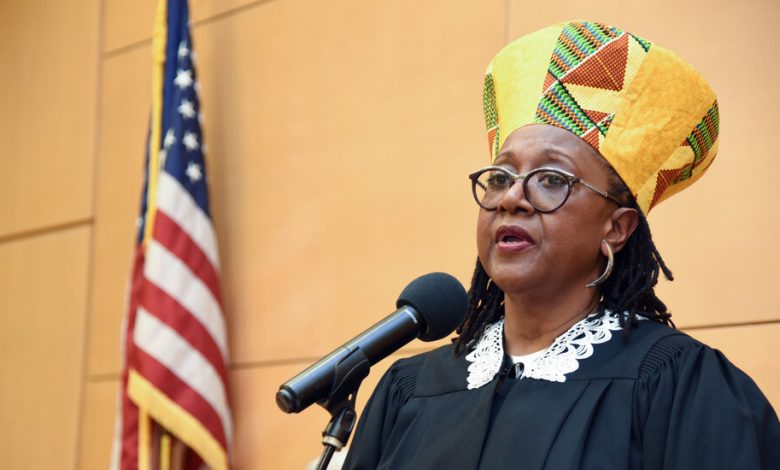Brooklyn Judge Accused of Making Racist and Homophobic Remarks Resigns

A Brooklyn judge accused of making racist and homophobic remarks about court workers, fellow judges and others has agreed to give up her seat on the bench, officials said on Monday.
The judge, Harriet L. Thompson of Brooklyn Surrogate’s Court, was set to face a misconduct hearing next week. In a legal filing, a top New York judge wrote that Judge Thompson said that “being gay is an abomination to mankind” and that Hispanic people had a “deceitful trait that goes way back to biblical times.”
Those comments and others, most of which Judge Thompson, 67, denied making but which an inspector general’s inquiry substantiated, helped form the basis of a formal complaint filed against her last year with the New York State Commission on Judicial Conduct.
The complaint also said that she had failed to administer Surrogate’s Court matters in a timely way since taking her seat in 2019. Surrogate’s Court, sometimes called widows and orphans court, oversees matters involving the dead, such as estates, wills and trusts.
Judge Thompson notified New York’s top administrative judge in a letter last Friday that she would be retiring from her $210,000-a-year post as one of two judges overseeing the Brooklyn court as of March 1.
As part of her agreement to step down, Judge Thompson pledged never to seek or accept a judicial position in the future and to halt any litigation she had initiated against the commission.
Judge Thompson initially sought to delay the hearing next week by telling the commission she was “not medically fit to stand trial at this time.” The commission said it had responded by authorizing a second complaint saying she was medically unfit to remain in office.
“The conduct charged against Judge Thompson was egregious and, if established at trial, would have warranted her removal from office,” the commission’s administrator, Robert H. Tembeckjian, said in a statement. “She now claims a medical condition prevents her from performing judicial duties, which opens a different path in furtherance of the public interest for her immediate and permanent departure from the bench.”
Andrew S. Fisher, a lawyer for Judge Thompson, noted that the agreement between his client and the commission contained “no finding of wrongdoing.” He added that “but for the intervention of her medical problems, she would have vigorously defended herself.”
Lucian Chalfen, a spokesman for courts, declined to comment. An acting surrogate court judge will continue to fill the vacated seat for the time being.
Judge Thompson’s decision to retire caps a tumultuous and truncated tenure in what was to be a 14-year term. Before being elected to the Surrogate’s Court, she was a Brooklyn Civil Court judge from 2011 to 2018.
The strife grew amid a dispute between her and Richard Buckheit, the court’s public administrator, a city official responsible for handling the estates of the dead. Judge Thompson supervised Mr. Buckheit’s office.
The clash began in May 2019, when Judge Thompson, who is Black, told state court officials that, according to members of Mr. Buckheit’s staff, he had created a hostile workplace for Black employees, The Daily News reported.
She also claimed that Mr. Buckheit, who is white, hired only young white men for temporary jobs, the newspaper said.
Mr. Buckheit denied the accusations and said that Judge Thompson had made them because she was homophobic and he was gay. He could not be reached for comment on Monday.
As the clash unfolded, effectively halting the work of Mr. Buckheit’s office, the state’s top administrative judge directed the court system’s inspector general to investigate complaints about Judge Thompson’s comments in the presence of court employees.
The ensuing report, in December 2021, detailed a litany of hateful remarks against Hispanic people, white people, gay people, people of West Indian descent and others, including those whose appearance or other personal characteristics she found offensive.
“She got what she deserved,” Judge Thompson said of one member of the judiciary whose diagnosis of early-onset Alzheimer’s disease had become public, the inspector general’s report found. “She smelled and had body odor,” Judge Thompson said of another, the report said.
Her comments about gay men were particularly harsh and regularly flecked with a common slur, the inspector general found. “I hate these gay white men,” the inspector general found that she had stated bluntly in one instance.
Judge Thompson said in a court filing that nearly all of the comments in question had been falsely attributed to her. She acknowledged making a derogatory remark about homosexuality generally, saying that her comment was constitutionally protected religious speech.
She was suspended without pay and forced to give up her keys and access cards to the courts shortly after the report was filed and while the judicial commission investigated.
Judge Thompson sued the court system and several officials over the suspension, arguing that the defendants did not have the authority to remove her from the bench and that she was victim of discrimination. That litigation remained active as of Monday.
